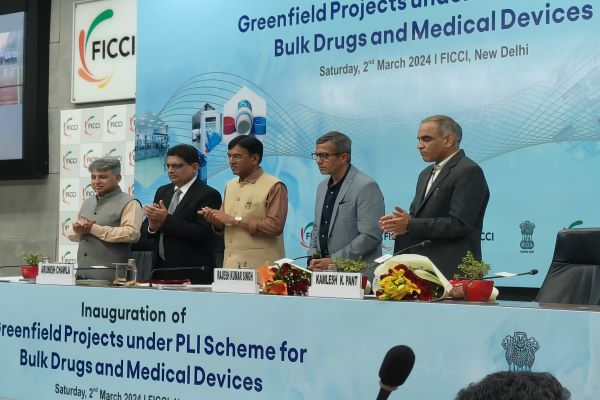PLI scheme envisages manufacturing of 41 Bulk Drugs with a total outlay of Rs. 6,940 cr. during the tenure of the scheme from 2020-21 to 2029-30

Dr. Mansukh Mandaviya, Union Minister for Chemicals & Fertilizers and Health & Family Welfare virtually inaugurated 27 greenfield bulk drug park projects and 13 greenfield manufacturing plants for medical devices, here on Saturday.
Addressing the gathering, Dr Mandaviya said, “Medicines are an essential requirement for any society. During the COVID-19 pandemic, the dangers of supply chain getting affected, the risks of being highly dependent on imports of critical resources like bulk drugs and medical devices and its potential effects on India’s pharma and MedTech sector led to a lot of brainstorming within the Union Government. The Production Linked Incentive (PLI) scheme is a result of these wide-ranging discussions”
Expressing his elation at the inauguration of these greenfield projects under the PLI scheme, the Union Minister said, “it is noteworthy that today India has not only reduced its dependence on medicines, API and medical devices, the country is also emerging as a major exporter of these products, thanks to the success of the PLI scheme.”
Dr Mandaviya said that “the PLI-I scheme of the Union Government identified 48 critical bulk drugs for manufacturing locally. The success of this inaugural scheme led the government to launch the Rs. 15,000 crore PLI-II scheme which envisaged to increase our cost competitiveness for medicines and medical products in the international market”.
Highlighting the Union Government’s efforts towards making India atmanirbhar in the field of critical medicines and active pharmaceutical ingredients (API), the Union Minister stated the example of Penicillin G, a widely used drug which were locally manufactured in India until the late 1980s. Due to globalisation, the import of Penicillin G led to the closure of all such plants in India. He highlighted that the Union Government is working on bringing back production of Penicillin G in India after three decades.
Rajesh Kumar Singh, Secretary, Dept. for Promotion of Industry and Internal Trade noted that Union Government approached the COVID-19 pandemic with a mindset to turn the crisis into an opportunity. He highlighted the efforts of the administration in enhancing self-reliance, innovation and infrastructure, including both physical and digital as displays of such a vision.
Singh stated that the PLI scheme was also envisaged through the same vision to bring in localisation and value addition to India’s pharma and MedTech industry and simultaneously also reduce over-dependence on critical resources from certain geographies.
Dr. Arunish Chawla, Secretary; Dept. of Pharmaceuticals gave a detailed presentation on the PLI scheme of the Union Government. He said that the drug and pharmaceutical industry in India witnessed a 12% compound annual growth rate (CAGR) in the last 10 years. He also highlighted that under the PLI scheme, as many as 1800 pharmaceutical products and formulations and 22 bulk drugs will be manufactured in India.
It was also informed that when the PLI scheme came in, India imported 90% of medical devices. After the introduction of the PLI scheme, the net imports of medical devices decreased for the first time in 2023.
Kamlesh K Pant, Chairman, National Pharmaceutical Pricing Authority (NPPA); Dr Sailesh K Pathak, Secretary General, Federation of Indian Chambers of Commerce and Industry (FICCI) and senior officials of the Union Government were present on the occasion.

Subscribe To Our Newsletter & Stay Updated